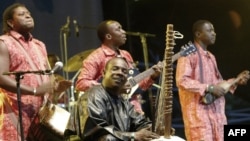Four years after the army staged a coup in Mali’s capital and jihadists banned music in areas they occupied, the country is beginning to reclaim its role as a regional hub for culture.
Last year, Bamako saw the return of Les Rencontres de Bamako, a biannual photo festival that was canceled after the 2012 crisis. More cultural events dot the horizon, including this week's four-day acoustic music festival in the capital.
Toumani Diabaté is one of Mali's most acclaimed musicians, winning two Grammys for his work on the kora, a guitar-like instrument. He said the return of the festival means a lot to Malians.
"It's not politics or politicians that move Mali and Africa forward,” he said, “it's the culture and especially the music. For a country like Mali that lives off and through its music and artists, it has a huge impact."
The festival in Bamako takes place amid continued security concerns following the attack on the Radisson hotel in November 2015 and the attack on a hotel in Burkina Faso's capital, Ouagadougou, on Jan. 15.
But artists can help Mali heal from its wounds, Diabaté said.
"Mali is known in the world for its music," he said. "Artists like Ali Farka Touré, Salif Keita, Rokia Traoré, Habib Kouyate, Vieux Farka, and Bassekou (Kouyate) and Ballaké [Sissoko have] put Mali on the map.
“This is however maybe only five, 10 percent of the musical talent in this country. We, the artists, can help Mali. It's not only the politicians. We, too, have an important role to play, but we lack the means."
The war and conflict has made life difficult for artists and music promoters. Most foreign artists and music producers are steering clear of Mali, making it harder for up-and-comers to make connections and launch themselves on the international circuit.
Terror, and luck
One exception is the band Songhoy Blues.
Three of the band's members are from towns in northern Mali. The conflict there drove them to Bamako, where the group formed at the height of the crisis in 2012.
Garba Touré, the band's guitarist, says that "without the crisis, there might not have been a Songhoy Blues at all."
"If the conflict in 2012 hadn't happened, maybe I wouldn't have been here in Bamako where I meet Aliou and Oumar with whom I formed the band,” he said. “The conflict was a time of terror and suffering but for us, for the band, it proved to be a strike of luck."
When British artist Damon Albarn took his transborder music project Africa Express to Bamako in 2013, he got word of a talented quartet that played the capital's bars and night clubs. The band auditioned for Albarn and was selected for the album Africa Express, bringing together Western and Malian artists.
Last year, the Songhoy Blues released its well-received debut album Music in Exile, chronicling the conflict while offering a message of peace and reconciliation.
The band plays the festival with Albarn on Friday night.












